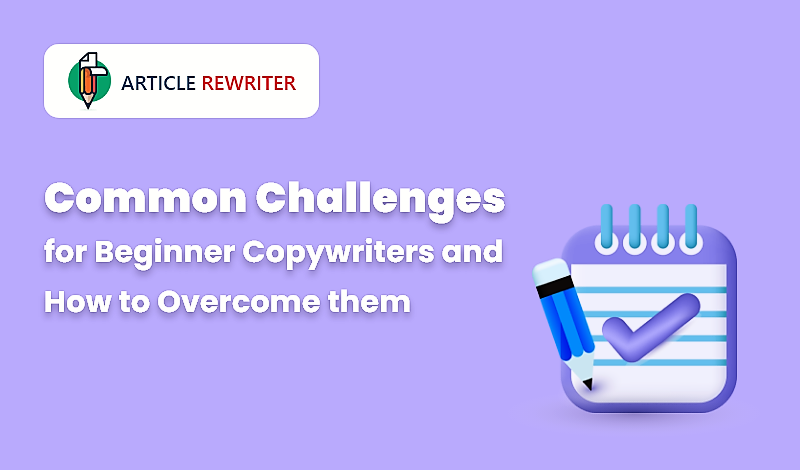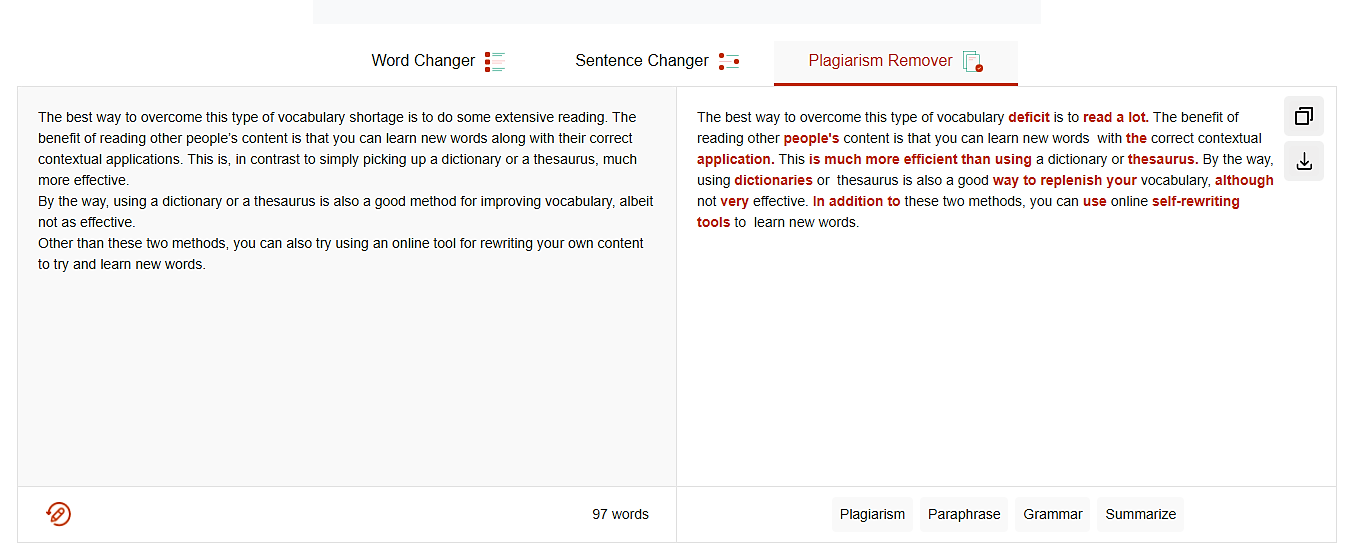
Common Challenges for Beginner Copywriters and How to Overcome Them
Copywriters can face different types of issues when starting out. Some of them may have trouble getting their creativity flowing while others can find it hard to pick the right tone for their audience.
There’s really not a certain type of hurdle or challenge that we can decisively attribute to every single copywriter out there. Something that one particular writer may have difficulty with could be exceedingly easy for another.
In this post, we’re going to be looking at a couple of different challenges and obstacles that can potentially be faced by a professional starting out in the copywriting biz. If there’s something in the list that you also have trouble with, you can simply look at the solution we proffer for it.
Challenges and Hurdles for Rookie Copywriters and Their Solutions
1. Shortage of Vocabulary – Issues with Repetition
What happens when a writer runs out of new words to use in their content? Well, they just start reusing the old ones. While that sounds fine, it’s actually not. Reusing the same words over and over again can make the write-up look clunky and amateurish. Instead of your content leaving a positive impression on your readers, it will have them thinking “Hey, I can write better than this dude.”
Can’t think of why or how repetition can ruin the quality of your content? Take a gander at the example below:
“This smartphone is designed for people who prefer a compact size as compared to the large brick-like forms in vogue today. The design of the phone is remarkable, owing to the intricate design at the back.”
So much ‘designing’…
The sentences look terrible. They won’t help in selling the product nor can they be used to nurture existing leads. This is more or less the function of copywriting content.
So, this is one of the problems that copywriters can face when they're starting out. It can ruin the quality of their content and also sabotage their chances of getting a good hire.
How to Overcome it?
The best way to overcome this type of vocabulary shortage is to do some extensive reading. The benefit of reading other people’s content is that you can learn new words along with their correct contextual applications. This is, as compared to simply picking up a dictionary or a thesaurus, much more effective.
By the way, using a dictionary or a thesaurus is also a good method for improving vocabulary, albeit not as effective.
Other than these two methods, you can also try using an online tool for rewriting your own content to try and learn new words.
How does that work? Let’s explain.
Basically, there are some online tools that work to rewrite a piece of content by changing its words, sentence structures and phrases in order to make it look different from its original version. These tools are called ‘Article Rewriters’.
If you use a good article rewriter for rewriting your content, it will change a lot of words with their suitable synonyms. Here, this is what it looks like:

In this screenshot, you can see how the tool changed the content by altering the sentence structures and also synonymizing it. For one, the word 'shortage' was changed to 'deficit'. (It’s not the best replacement, but it works.)
Similarly, the word ‘effective’ was changed to ‘efficient’. The word ‘improving’ was somehow changed to ‘replenish’.
As you may have observed, the advantage of using this method for building vocabulary is that you automatically understand what the words mean and where they have to be used. Since you’re using your own content, you don’t have trouble grasping the actual meaning of the altered words if you rewrite a sentence.
2. Keyword Adjustments
Nowadays, keywords are used in almost every type of copywriting material, be it descriptions, blog posts or anything of the sort.
Rookie copywriters can often go wrong with adjusting the keywords. They can make the keywords stand out too conspicuously…which hurts the quality of their content.
Readers also often feel put off when they're going through a piece of content and a random generic keyword just pops out at them. This makes it look as if the publisher really doesn't care about the readership, and just wants to get their keywords in the content somehow.
Take this example:
“If your car is having trouble going around in all the snow, contact us now for tire chains New York and we’ll help you out.”
This line looks terrible. The whole grammatical integrity of the sentence was compromised just for the sake of adjusting the keyword. And this is pretty much the blunder that rookie copywriters can make in their content.
How to Overcome It?
The only way to overcome unnatural keyword placements is…to be natural.
When you want to adjust a keyword, you first have to make sure that the preceding discussion is relevant to it. Don't stuff a keyword randomly without any sort of context.
Then, other than ensuring the relevancy of the surrounding content, you have to make sure that there is no compromise on the flow and grammar of the content.
If we take the same keyword that we did in the example above, here is what a natural placement would look like:
“If your car is having trouble going around in all the snow, contact us now for buying some tire chains. New York, New Jersey and Pennsylvania-based customers can enjoy our services.”
This adjustment is much better. Having a period or comma in the keyword is inconsequential so, breaking the sentence is fine.
3. The ‘Archaic Affliction’ – Overuse of Formal Transition Words
As a rule, using transition words in your content can help in improving readability. This is something you’ll know if you ever use the ‘Yoast Real-Time Content Analyzer’ for checking your write-ups.
Unfortunately, when copywriters start out, they can use transition words a lot in their content…without realizing it. You’d often find the work of a rookie containing the words ‘thus’, ‘therefore’, ‘hence’, and ‘furthermore’ in a disturbing number. The medieval-ish nature of these words is why we’ve dubbed this hurdle the ‘Archaic Affliction’.
Here, let’s give an example to explain this one a bit better:
“Therefore, you should buy our premium plans to avoid all the ads. Hence, your experiences will be smoother. Furthermore, you will be able to get your work done quickly. Thus, your life will get easier.”
How to Overcome It?
Overcoming this problem merely requires you to be a little careful every time you have to use transition words in your content. Whenever you get the urge to use one, take a quick look to see where you entered the last one. If the last transition word that you used is a couple of sentences behind, you can go ahead with the new one.
4. Introduction and Conclusion Writing
The introduction and conclusion are two of the most important parts of a piece of content. If the introduction is written properly, you can make a good impression on your reader, which will induce them to read the content till the end.
On the other hand, if the introduction is not properly written, your reader will get driven off even if the main body of the content is high-quality.
A lot of writers can have trouble with the introduction and conclusion when writing a blog post or an article. Some of them can stretch it out for too long whereas others can simply blank out with no idea of what to write.
How to Overcome it?
A good technique for writing effective introductions and conclusions is to do it at the end. In other words, you should write the main body first, and then summarize it differently twice: once for the intro and once for the conclusion. (Mind you, the tone and style also have to be drastically different in both.)
You can easily summarize the content yourself, but if you don’t have the time, you can use a summary rewriter instead.
Summary writers, or summarizing tools, are software that are designed to scan a piece of content and create a summary for it by extracting meaningful sentences and phrases from it.
5. Plagiarism – The Perennial Problem
Plagiarism is perhaps one of the most common issues that are faced not just by copywriters, but by virtually every individual in the writing biz.
Plagiarism is basically defined as the act of using someone else’s content without giving them credit. Although the usual nature of this act is malicious, it can frequently be committed unintentionally even by honest users.
Beginner copywriters can have trouble with this problem since they can finalize their write-ups without checking and eliminating plagiarism from it. Expert writers usually take care of this during the content optimization phase.
How to Overcome It?
The only way to overcome accidental plagiarism is to be vigilant about checking it once you are done with your write-up. You have to use a plagiarism checker (a reliable one) to determine whether any part of your text is duplicated or not.
You can remove duplicate content from the write-up by simply rewriting it or by accrediting the source to which it originally belongs.
Conclusion
Although there are a lot of other challenges and hurdles that rookie copywriters can face, the ones mentioned above are some of the most common.
If you’re a rookie copywriter yourself



